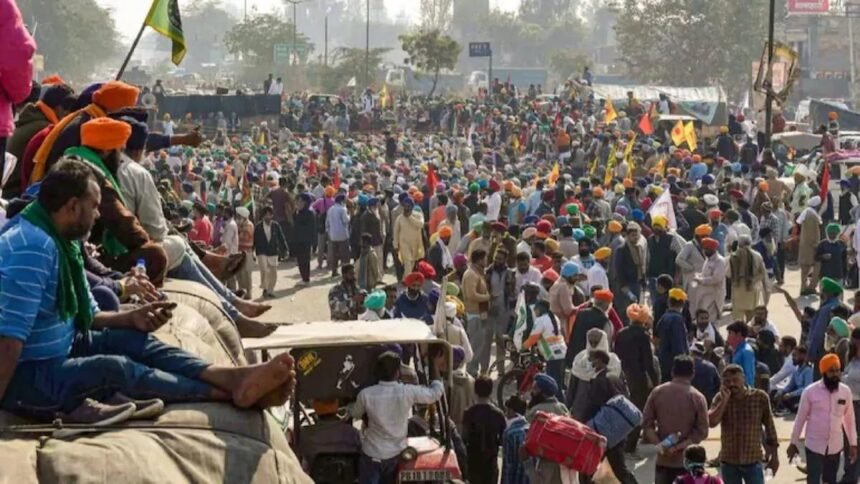In a notable development, a scheduled farmer’s protest march towards Parliament was abruptly halted in Noida, resulting in extensive traffic disturbances and heightening the prevailing tensions between farmers and the government. The protest, organized by various farmer unions, aimed to draw attention to the long-standing grievances of agricultural workers and demand the repeal of contentious farm laws.
The decision to stage the protest march came amidst simmering discontent within the farming community over the government’s agricultural policies, particularly the three farm laws passed in 2020. These laws, intended to liberalize agricultural markets and provide farmers with more options to sell their produce, have been met with fierce opposition from farmers who fear that they will lead to the dismantling of the existing support system and leave them vulnerable to exploitation by large corporations.
As the protesters began their march towards Parliament, they were met with heavy police presence and barricades, preventing them from advancing further. The situation quickly escalated as clashes erupted between protesters and law enforcement officers, further exacerbating the already tense atmosphere.
The decision to block the protest march has sparked criticism from opposition parties and civil society groups, who have accused the government of suppressing dissent and infringing upon the democratic right to peaceful protest. Many have condemned the heavy-handed tactics employed by the authorities and called for dialogue and reconciliation to address the grievances of the farming community.
The farmer’s protest march in Noida is just the latest episode in a protracted standoff between farmers and the government that has been ongoing for over a year. Since the passage of the farm laws, farmers from across the country, particularly from the states of Punjab, Haryana, and Uttar Pradesh, have been camping at the borders of Delhi, demanding the repeal of the laws and a legal guarantee for minimum support prices for agricultural produce.
The farmers’ agitation has garnered widespread support both nationally and internationally, with solidarity protests being held in various parts of the world. The movement has also received backing from opposition parties, civil society organizations, and celebrities, further amplifying its visibility and impact.
Despite several rounds of talks between farmer leaders and government representatives, including the formation of a committee to examine the farm laws, no resolution has been reached thus far. The deadlock persists, with both sides unwilling to back down from their respective positions.
In light of the recent events in Noida, there is a pressing need for constructive dialogue and a peaceful resolution to the farmer’s grievances. The government must demonstrate a willingness to engage in sincere negotiations and address the concerns of the farming community, recognizing the vital role they play in India’s agricultural sector and economy.
At the same time, farmers must also remain steadfast in their demands and continue to assert their rights through peaceful means. The right to protest is a fundamental tenet of democracy, and it is essential that their voices are heard and their concerns addressed in a manner that respects their dignity and autonomy.
The farmer’s protest march in Noida underscores the persistent challenges confronting India’s agricultural industry while also offering a chance for constructive dialogue and transformative change. By engaging in genuine dialogue and adopting a collaborative approach, the government and farmers can work together to find sustainable solutions that ensure the well-being and prosperity of all stakeholders involved.




